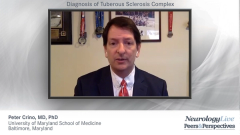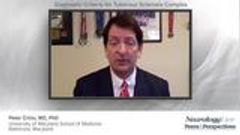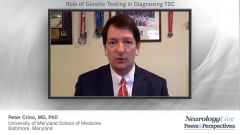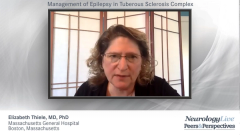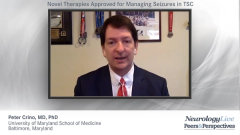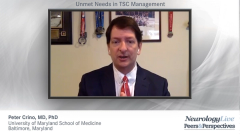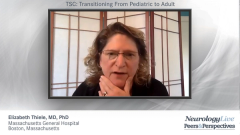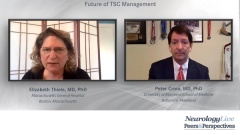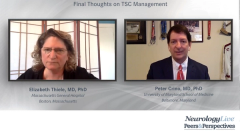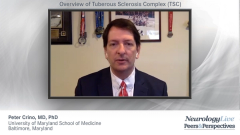
Novel Therapies Approved for Managing Seizures in TSC
Peter Crino, MD, PhD, leads the discussion on exciting developments in approved therapies for managing seizures in TSC including the use of everolimus and cannabidiol.
Episodes in this series

Peter Crino, MD, PhD: There have been other exciting developments. In addition to the standard antiepileptic drugs, we have the appearance on the scene of everolimus, which in many ways is a disease-modifying therapy. It’s a class of the drugs of the mTOR inhibitor drugs. There’s good evidence that some individuals, when dosed appropriately with this medicine, will get a reduction or even seizure freedom. That’s very heartening, quite frankly. That’s an exciting option. There’s the recent appearance of cannabidiol on the scene as a potential therapeutic modality. Obviously, your research has shown that this modality is a novel strategy. It’s not 1 of the conventional antiepileptic drugs, and it clearly has a role and benefit in the treatment of seizures in TSC [tuberous sclerosis complex]. From the perspective of nonmedical therapies, there is standard epilepsy surgery, where we remove a part of the brain that’s causing seizures.
There has recently been the appearance of so-called neuromodulation, which is the use of something known as responsive neurostimulation—an implantable device in the brain that lets us countermand seizures by simply delivering electrical stimulus to the part of the brain where seizures are coming from. That technology has been completely new on the scene since you and I were in training, for sure. It’s a new avenue of therapy. We’ve got multiple medicines, we’ve got some new types of medicines, we have standard epilepsy surgery, and we have neuromodulation. There are lots of choices for practitioners to consider and evaluate.
Elizabeth Thiele, MD, PhD: To your point about the medications, I approach the initial treatment of seizures in TS [tuberous sclerosis] other than infantile spasms as I would anyone coming in with focal seizure using the same antiseizure medications. I don’t think there’s any evidence. We all have our own personal experiences: “Well, this drug might be particularly effective here, or that drug might be particularly effective there.” But there haven’t been any real comparisons with either the traditional or new antiseizure medications, or the 2 that have FDA approval for treatment of seizures in TSC: Afinitor or cannabidiol, GW Pharmaceutical or Epidiolex.
It’s exciting in the world of TS. For us, I remember when the mTOR pathway was implicated to be involved in TS. We were talking about that at the meeting in Chantilly, Virginia, and then seeing the trials of the mTOR inhibitors for the various symptoms of TS—angiomyolipoma, LAM [lymphangioleiomyomatosis]. It’s very exciting to realize that we do have therapies that can be disease modifying and are really helping a lot of individuals with TS. Clearly, a lot more needs to be done to come up with more definitive and effective treatments, but it’s been very exciting.
You’re right. My past 7 years have been focused on how effective is cannabidiol in the treatment of seizures in TS? There’s been a lot of excitement in the patient and medical community that this does appear to be an effective medication. Even to have 2 medications with FDA approval specifically for treating seizures in TS—there’s no evidence that they’re better than our traditional antiseizure medications but having them is exciting. You mentioned diet. As you know, I’m also zealous for dietary therapy. We’ve looked at this and utilized both the classic ketogenic diet as well as low glycemic index treatment in the management. There’s hope for people living with tuberous sclerosis with epilepsy that their epilepsy can be controlled. Typically, I approach thinking about refractory epilepsy and TS similarly to how I do my other patients. Wouldn’t you say? Lesional epilepsy, and if people don’t respond to the first couple of medications, then consider what other therapies—either nonpharmacological or surgery—would be an option.
Peter Crino, MD, PhD: Definitely. I was just on a research roundtable about this a while ago. There’s no evidence that any of the existing commercially marketed antiepileptic drugs have any particular benefit or role in TSC epilepsy. Nothing has been shown to work for people with TSC1 vs TSC2, or complex partial and the old mode, the old terminology seizures or generalized. There’s nothing that really comes out. It is very much as you approach all focal onset epilepsies: You may have as a practitioner your own favorites that you start with, and you run through a couple of them. The data still hold up that if you have an individual who has gone through 3 medications, can tolerate them, is compliant, has therapeutic levels, and still has seizures despite those medicines, there’s no reason to delay an evaluation for epilepsy surgery in that patient. As a matter of fact, I would say the more common scenario is that people keep trying drugs and delaying an evaluation for epilepsy surgery.
After 3 medicines, that’s the time to consider whether they are a candidate for epilepsy surgery. Obviously, not everyone is a candidate, but that’s the time to think about it and get the person into the monitoring unit, so that’s pretty standard for focal onset epilepsy care. The addition of the 2 novel pharmacologies with an mTOR inhibitor and cannabidiol allows us some latitude to try some different strategies. The other is superimposing existing antiepileptic drugs on top of these new medications, which is a new world that we still have to investigate. Compared with even just a decade ago, there’s a lot more optimism and hope in terms of being able to get seizure freedom, or at least achieving a palliative reduction in daily seizure burden.
Elizabeth Thiele, MD, PhD: Over the years, a lot of the work we’ve done has been focused on looking at what impact a variable of epilepsy has on the other neurological aspects of TS, including cognitive impairment, autism, and behavior. We’ve shown, and others have shown, that clearly refractory epilepsy, infantile spasm, etc., are significant variables. When I talk to my colleagues, students, residents, and patients, we emphasize the importance of getting seizure control because it could impact many aspects for that individual, like cognition. The other exciting thing that’s been going on in the world of TS, is that we’re at the point where we ask if we could we consider prophylactic therapy. The trial going on in the United States and Europe looking at early treatment vigabatrin, could that prevent the epilepsy from developing? That’s another exciting aspect that we’re very fortunate to have because many babies are diagnosed with TS prior to the onset of seizures either from a family history, or cardiac rhabdomyomas or skin features. Could we intervene if we know a person has TS to prevent the epilepsy from happening? It could have significant impact on that individual’s life.
Peter Crino, MD, PhD: Without question. The recently published EPISTOP trial that was just published provides very encouraging ideas that are keeping with the theme I suggested before, which is getting in front of things in tuberous sclerosis by being proactive and having a surveillance mode. Clearly, this is going to be the wave of the future, which is identifying babies who are at risk, and even discussion of wholesale newborn screening to try to identify in the general population babies who have TSC. And knowing that you can use EEG [electroencephalogram] as a biomarker to see if the brain is already starting to have abnormalities and how it’s wiring itself at very early stages by starting these individuals on disease-modifying therapies, whether it’s vigabatrin or an mTOR inhibitor.
The idea that you could modify the evolution of tuberous sclerosis—so that, for example, epilepsy or intellectual disability or autism spectrum disorder does not appear or appears in a lesser severity—is wholly new, wholly exciting, and the wave of the future quite frankly. We’ll be seeing that in the next 5 to 10 years.
Elizabeth Thiele, MD, PhD: It’s really exciting.
I’d like to thank the audience for watching this Neurology Live® webinar. If you enjoyed the content, please subscribe to our e-newsletters to receive upcoming programs and other great content right in your in-box.
Transcript Edited for Clarity
Newsletter
Keep your finger on the pulse of neurology—subscribe to NeurologyLive for expert interviews, new data, and breakthrough treatment updates.

